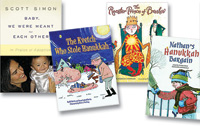I was delighted to receive a review copy of Scott Simon’s Baby, We Were Meant for Each Other: In Praise of Adoption (Random House, cloth, $22), since I have already been intrigued by his radio essays on the subject. Simon is the host of NPR’s “Weekend Edition Saturday,” and he and his wife adopted two girls from China. Now he can expand on his personal experiences and reflect on adoption in general, Chinese adoption in particular, and the negative impact of that country’s one-child policy on the human rights of women.
Simon masterfully captures the poig-
nant process of “falling in love” with his daughters and also shares the stories of other adoptive families. Most have happy endings, including some reunions with birth parents, but he doesn’t shy away from a few bad endings. Raising an adopted child, we see, is just as satisfying and fraught with peril as raising a birth child.
The book moves along at a good clip and Simon gets us laughing and crying as he explains how families really are made.
No matter how your family was made, here are a number of books for the children in your life.
A clever book, and a clear tribute to Dr. Seuss, The Kvetch Who Stole Hanukkah (Pelican, cloth, $16.99), by Bill Berlin and Susan Isakoff Berlin, with illustrations by Peter Welling, sends us on a rhyming romp through the town of Oyville. There, a kvetch has decided to turn Hanukkah upside down, disappointing the local children. (“”˜Hanukkah, shmanukkah—it’s all about gifts,’/Shouted the kvetch, and he sounded quite miffed.”) It is the children’s efforts, though, that create a true Hanukkah miracle.
Ann Redisch Stampler re-tells a Chassidic tale in The Rooster Prince of Breslov (Clarion, cloth, $16.99) with illustrations by Eugene Yelchin. An overindulged young prince, fed up with his life of leisure, acts out by pretending to be a rooster. Doctors and magicians fail to cure him, but an ordinary old man bests them with his simple wisdom in this story of what it really means to be a human being, or, if you will, a mensch. The author learned this story from her grandmother, who came “from an impoverished village in eastern Europe.”
In Nathan’s Hanukkah Bargain by Jacqueline Dembar Greene (Pelican, cloth, $15.95), a boy who badly wants his own menorah and doesn’t have enough money, is subtly helped by an understanding grandfather to find a real treasure. The illustrations are by Judith Hierstein.
For older readers (9 and up) comes the engaging and exciting graphic novel Hereville: How Mirka Got Her Sword by Portland graphic artist Barry Deutsch (Abrams, cloth, $15.95). While it features Orthodox characters in an Orthodox Jewish town, this book does not belong to the sub-genre of books aimed at only Orthodox readers. Featuring “yet another troll-fighting 11-year-old Orthodox Jewish girl,” Deutsch appeals to almost any reader with his heroine Mirka. She just wants to do something a little different, but ends up involved with a witch and a talking pig. The author cleverly incorporates explanations of cultural and religious values, along with a little Yiddish, in this clever blend of fantasy and reality.
Now parents, take note: in a mere blink of an eye, the adorable preschooler you are reading these books to will transform into a much larger child who will need to be sent off to college.
To the myriad of college guides already available, you might add Oy Vey, It’s Time to Apply: A Cultural Guide to Colleges for Jewish Parents by Jerome Ostrov (self-published, paper, $17.95 Amazon.com). The author is not a college advisor, but an attorney with a passion for colleges who wants to share information he’s gathered over many years. He admits his subjectivity, “both unscientific and time honored,” and stresses that it’s no “shanda” (shame) if your brilliant Jewish daughter or son attends a college that is not one of the country’s top-ranked.
Providing an historical overview of American Jews and higher education, he profiles the attitudes of today’s average Jewish parent. Ostrov then summarizes 100 colleges of interest from a Jewish perspective ranging from best-known to almost unknown (Richard Stockton College of New Jersey, anyone?). He concludes with chapters on getting in, paying for it, and coping with college life.
Oy Vey reads well, but suffers from a lack of proofreading common in self-publishing.
For your son or daughter already in college, the little College Knowledge for the Jewish Student: 101 Tips by David Schoem (U. of Michigan, paper, $20.95) is a handy four-year survival guide full
of encouragement and wisdom for the student in your life.
New Jewish books for and about children —
